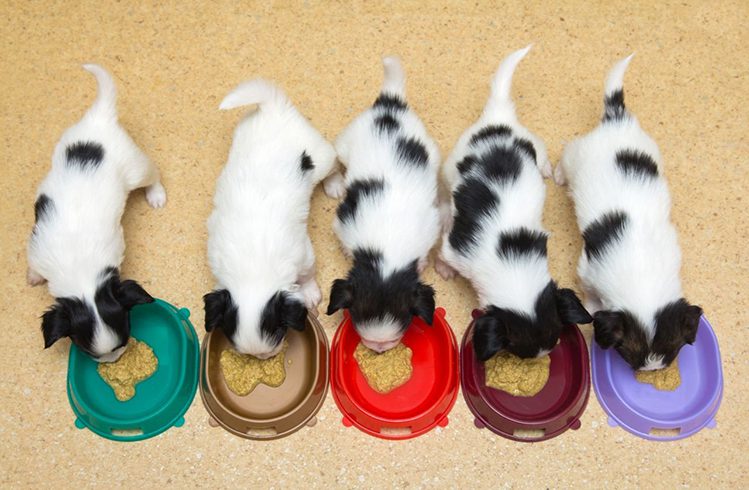
First food for puppies
Why do puppies need complementary foods and what kind? When can puppies be fed and why? About this and much more in our article.
The first feeding of puppies is an important step towards their harmonious development, the foundation for good health and quality of life in the future. Complementary foods allow you to make the transition from mother’s milk to an adult diet smooth and safe, saturate the fragile body with vitamins and minerals necessary for rapid metabolism.
Any change in diet can cause serious digestive upset even in an adult, perfectly healthy dog. What to say about puppies whose body is not yet strong? Puppies feed on their mother’s milk until they are 2 months old, but their partial introduction to the adult diet should begin at an earlier age. And that’s why.
If a breast-fed baby is abruptly transferred to self-feeding, this will cause great stress to the body and make it vulnerable to a huge number of infections. In addition, a rapidly growing puppy’s body needs a full range of nutrients, minerals and vitamins every day. As the puppy grows older, mother’s milk is not enough to fully satisfy this need. Thanks to complementary foods, the puppy gradually gets acquainted with a different type of feeding, without losing the usual food – mother’s milk, and at the same time receiving the full range of nutrients he needs.
Mother’s milk is the best food for helpless newborns. But already at the age of 2-3 weeks, the puppies open their eyes and ears – and they become ready to get acquainted with the outside world. This age is ideal for the appointment of the first complementary foods. It is very important not to rush and not be late.
If puppies are given complementary foods prematurely, this will lead to a reduction in the mother’s milk production (since the puppies will consume less milk due to the food), disruption of natural nutrition and malnutrition. At the same time, delayed feeding will lead to slow growth and development of the body. The puppy will grow up weak and sickly.

Puppies should be fed with the food that you plan to give them in the future.
When choosing a natural type of feeding, suitable natural products are gradually introduced into the puppy’s diet. However, here you need to be very careful, because it is easy for a beginner to make a mistake with the choice of products. Forming the diet of an adult dog on your own, and even more so, introducing complementary foods into the diet of a puppy, you need to take into account many nuances. The health of your pets directly depends on them.
It should be understood that it is impossible to ideally balance the beneficial components of the feed at home and the animals will need additional vitamin and mineral supplements. It is much easier to make a choice in favor of high-quality ready-made complete foods, as their composition fully meets the daily needs of the dog. Same with the first meal. Best of all, this role is suitable for special dry food for the first feeding of puppies. It’s called a starter.
Starters are assigned to puppies at the age of 2-3 weeks. High-quality starters are ideal complementary foods for babies. They are designed according to the needs of the fast growing organism and their composition is carefully balanced. Such food is easily digestible, does not cause indigestion and saturates the body with a full range of vitamins and minerals for proper development.
But what is so special about the composition of starters, why are they better than natural food? Let’s break it down based on the popular Monge puppy starter (Monge Superpremium Starter).
The starter has a high content of fats and protein, which is very important for the development of a puppy during a period of rapid metabolism.
The high protein content in the starter ensures the proper formation of muscle tissue.
The composition of the starter includes glucosamine, chondroitin, calcium and phosphorus – exactly in the amount that is necessary for the healthy formation and development of the skeleton and cartilage tissue.
The starter contains XOS for the formation and strengthening of the puppy’s independent immunity.
For the production of the starter, only high-quality fresh meat is used, which does not cause problems with digestion and promotes easy absorption of nutrients.
When fed with a starter, additional vitamins and minerals in the diet are not required.

Balanced starters can be used not only as complementary foods, but also for feeding an adult dog during pregnancy and lactation, which is very convenient.
Whatever food you choose, do not forget that you should never mix two types of feeding (natural and ready-made)!
When introducing complementary foods to your puppy’s diet, do not hesitate to consult with experienced breeders and experts. This is an important issue that requires your attention and the right approach. It is in the first weeks and months of life that the foundation for the subsequent health of your pets is laid, and it is not worth risking it.
Very soon, at the age of 2 months, babies will need to be transferred to complete puppy food. But we will talk about this in our next article.





